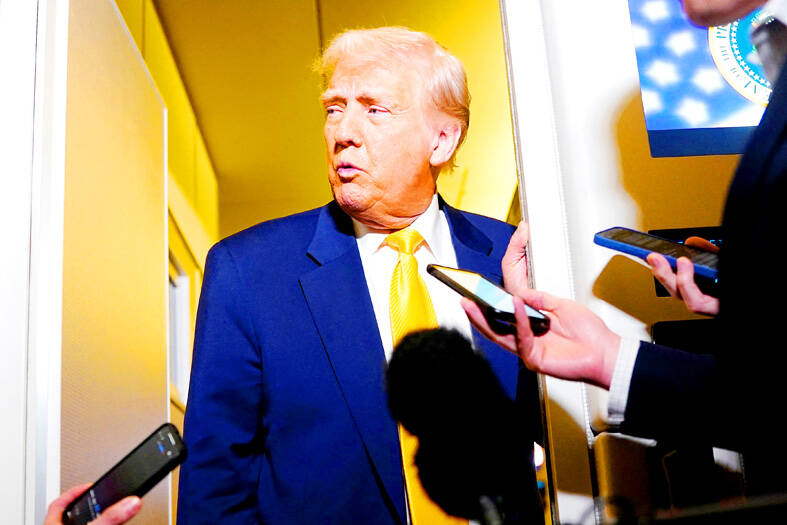US President Donald Trump’s administration exempted smartphones, computers and other electronics from its “reciprocal” tariffs, representing a major reprieve for global technology manufacturers including Apple Inc and Nvidia Corp, even if it proves a temporary one.
The exclusions, published late on Friday by the US Customs and Border Protection Agency, narrow the scope of the levies by excluding the products from Trump’s 125 percent China tariff and his baseline 10 percent global tariff on nearly all other countries.
The exclusions apply to smartphones, laptop computers, hard drives, computer processors and memory chips as well as flat-screen displays. Those popular consumer electronics items generally are not made in the US.

Photo: REUTERS
The move is the first significant easing of any kind in the US trade dispute with China. It was backdated to April 5.
Trump on Saturday declined to elaborate on the exemptions, but hinted at further developments today.
“I’ll give you that answer on Monday. We’ll be very specific on Monday,” he told reporters on Air Force One. “We’re taking in a lot of money; as a country we’re taking in a lot of money.”
The White House also released a corresponding memo indicating that the exemptions also extend to changes in small-parcel shipping duties.
Trump had moved to end the so-called “de minimis” exemption, beginning with China, which generally means parcels worth US$800 or below do not face duties.
Although listed among the exempted goods, semiconductors could still become a target of industry-specific tariffs Trump has suggested placing on imports from all countries.
“President Trump has made it clear America cannot rely on China to manufacturing critical technologies such as semiconductors, chips, smartphones and laptops,” White House press secretary Karoline Leavitt said in a statement.
“That’s why the president has secured trillions of dollars in US investments from the largest tech companies in the world,” she said, adding that the companies are “hustling to onshore” their manufacturing to the US.

Intelligence agents have recorded 510,000 instances of “controversial information” being spread online by the Chinese Communist Party (CCP) so far this year, the National Security Bureau (NSB) said in a report yesterday, as it warned of artificial intelligence (AI) being employed to generate destabilizing misinformation. The bureau submitted a written report to the Legislative Yuan in preparation for National Security Bureau Director-General Tsai Ming-yen’s (蔡明彥) appearance before the Foreign Affairs and National Defense Committee today. The CCP has been using cognitive warfare to divide Taiwanese society by commenting on controversial issues such as Taiwan Semiconductor Manufacturing Co’s (TSMC, 台積電) investments in the

INVESTIGATION: The case is the latest instance of a DPP figure being implicated in an espionage network accused of allegedly leaking information to Chinese intelligence Democratic Progressive Party (DPP) member Ho Jen-chieh (何仁傑) was detained and held incommunicado yesterday on suspicion of spying for China during his tenure as assistant to then-minister of foreign affairs Joseph Wu (吳釗燮). The Taipei District Prosecutors’ Office said Ho was implicated during its investigation into alleged spying activities by former Presidential Office consultant Wu Shang-yu (吳尚雨). Prosecutors said there is reason to believe Ho breached the National Security Act (國家安全法) by leaking classified Ministry of Foreign Affairs information to Chinese intelligence. Following interrogation, prosecutors petitioned the Taipei District Court to detain Ho, citing concerns over potential collusion or tampering of evidence. The

‘COMPREHENSIVE PLAN’: Lin Chia-lung said that the government was ready to talk about a variety of issues, including investment in and purchases from the US The National Stabilization Fund (NSF) yesterday announced that it would step in to staunch stock market losses for the ninth time in the nation’s history. An NSF board meeting, originally scheduled for Monday next week, was moved to yesterday after stocks plummeted in the wake of US President Donald Trump’s announcement of 32 percent tariffs on Taiwan on Wednesday last week. Board members voted to support the stock market with the NT$500 billion (US$15.15 billion) fund, with injections of funds to begin as soon as today. The NSF in 2000 injected NT$120 billion to stabilize stocks, the most ever. The lowest amount it

NEGOTIATIONS: Taiwan has good relations with Washington and the outlook for the negotiations looks promising, Minister of Economic Affairs J.W. Kuo said Taiwan’s GDP growth this year is expected to decrease by 0.43 to 1.61 percentage points due to the effects of US tariffs, National Development Council (NDC) Minister Paul Liu (劉鏡清) said at a meeting of the legislature’s Economics Committee in Taipei yesterday, citing a preliminary estimate by a private research institution. Taiwan’s economy would be significantly affected by the 32 percent “reciprocal” tariffs slapped by the US, which took effect yesterday, Liu said, adding that GDP growth could fall below 3 percent and potentially even dip below 2 percent to 1.53 percent this year. The council has commissioned another institution